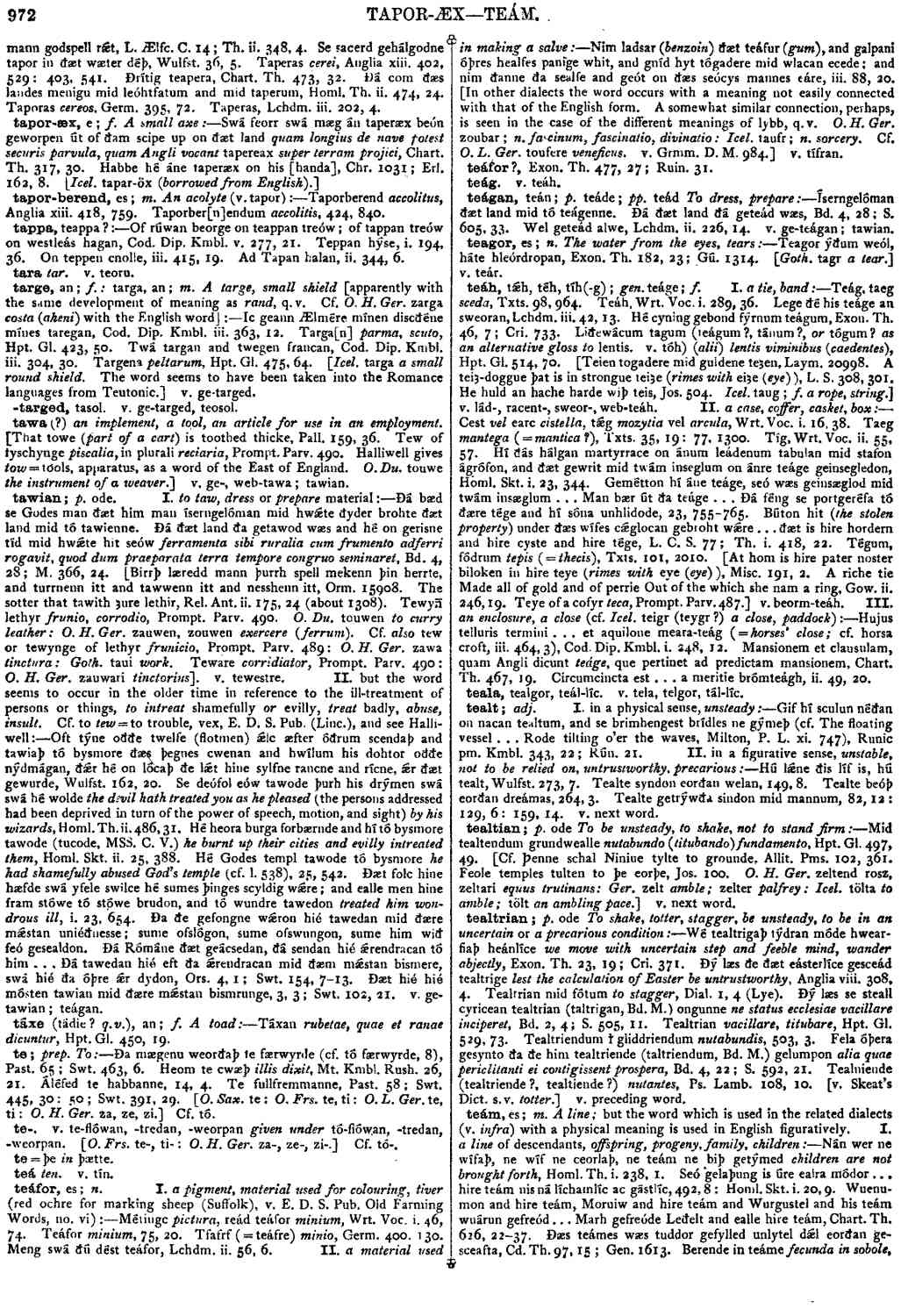tawian
- verb [ weak ]
-
Ðá bæd se Godes man ðæt him man íserngelóman mid hwǽte ðyder brohte ðæt land mid tó tawienne. Ðá ðæt land ða getawod wæs and hé on gerisne tíd mid hwǽte hit seów
ferramenta sibi ruralia cum frumento adferri rogavit, quod dum praeparata terra tempore congruo seminaret,
- Bd. 4, 28; M. 366, 24.
- Orm. 15908.
-
The sotter that tawith ȝure lethir,
- Rel. Ant. ii. 175, 24 (about 1308).
Tewyn lethyr
frunio, corrodio,
- Prompt. Parv. 490.
- Prompt. Parv, 489:
- Prompt. Parv. 490:
-
Oft týne oððe twelfe (flotmen) ǽlc æfter óðrum scendaþ and tawiaþ tó bysmore ðæs þegnes cwenan and hwílum his dohtor oððe nýdmágan, ðær hé on lócaþ ðe lǽt hine sylfne rancne and rícne, ǽr ðæt gewurde,
- Wulfst. 162, 20.
-
Se deófol eów tawode þurh his drýmen swá swá hé wolde
the devil hath treated you as he pleased (the persons addressed had been deprived in turn of the power of speech, motion, and sight) by his wizards,
- Homl. Th. ii. 486, 31.
-
Hé heora burga forbærnde and hí tó bysmore tawode (tucode, MSS. C. V.)
he burnt up their cities and evilly intreated them,
- Homl. Skt. ii. 25, 388.
-
Hé Godes templ tawode tó bysmore
he had shamefully abused God's temple
- (
- cf. l. 538 ),
- 25, 542.
-
Ðæt folc hine hæfde swá yfele swilce hé sumes þinges scyldig wǽre; and ealle men hine fram stówe tó stówe brudon, and tó wundre tawedon
treated him wondrous ill,
- i. 23, 654.
-
Ða ðe gefongne wǽron hié tawedan mid ðære mǽstan uniéðnesse; sume ofslógon, sume ofswungon, sume him wið feó gesealdon. Ðá Rómáne ðæt geácsedan, ðá sendan hié ǽrendracan tó him ... Ðá tawedan hié eft ða ǽrendracan mid ðæm mǽstan bismere, swá hié ða óþre ǽr dydon,
- Ors. 4, 1;
- Swt. 154, 7-13.
-
Ðæt hié hié mósten tawian mid ðære mǽstan bismrunge,
- 3, 3;
- Swt. 102, 21.
Bosworth, Joseph. “tawian.” In An Anglo-Saxon Dictionary Online, edited by Thomas Northcote Toller, Christ Sean, and Ondřej Tichy. Prague: Faculty of Arts, Charles University, 2014. https://bosworthtoller.com/30220.
Checked: 1